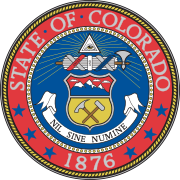In the politics of the United States, the process of initiatives and referendums allow citizens of many U.S. states to place new legislation on a popular ballot, or to place legislation that has recently been passed by a legislature on a ballot for a popular vote. Initiatives and referendums, along with recall elections and popular primary elections, are signature reforms of the Progressive Era; they are written into several state constitutions, particularly in the West.

William Simon U'Ren was an American lawyer and political activist. U'Ren promoted and helped pass a corrupt practices act, the presidential primary, and direct election of U.S. senators. As a progressive activist, U'Ren championed the initiative, referendum, and recall systems in an effort to bring about a Georgist "Single Tax" on the unimproved value of land, but these measures were also designed to promote democracy and weaken the power of backstage elites. His reforms in Oregon were widely copied in other states. He supported numerous other reforms, such as the interactive model of proportional representation, which was not enacted.

The Colorado Supreme Court is the highest court in the U.S. state of Colorado. Located in Denver, the Court consists of a Chief Justice and six Associate Justices.
Amendment 44 was a proposed amendment to the state statutes submitted for referendum in the 2006 general elections in the U.S. state of Colorado. The amendment proposed the legalization of the possession of one ounce or less of marijuana for any person twenty-one years of age and over, as long as marijuana use does not occur in public. The measure was eventually defeated at the polls by 60-40 percent.

Amendment 38 was a measure on the 2006 ballot in Colorado. If passed, it would have amended the Colorado Constitution. It would have extend the petition process to all levels of state government to expand citizens' ability to propose changes to state laws and local ordinances or resolutions.

Amendment 41 is a citizen initiative adopted by Colorado voters in the 2006 general election. Amendment 41 has three main sections.

The 75th Oregon Legislative Assembly convened beginning on January 12, 2009, for its biennial regular session. All of the 60 seats in the House of Representatives and half of the 30 seats in the State Senate were up for election in 2008; the general election for those seats took place on November 4.

Initiative 126 or the Savings Account for Education Initiative will appear on the ballot as Amendment 59. The measure would create a savings account within the State Education Fund, to be funded from 10% of the monies deposited into the State Education Fund, including revenue that would otherwise be rebated under the TABOR rules, which the measure calls for diverting to the State Education Fund.

Colorado Amendment 50 was a citizen’s initiative that amended the Colorado state constitution to:

Amendment 46, also known as the "Colorado Civil Rights Initiative, was a proposed initiative on the Colorado ballot for 2008. If ratified, Article II of the Colorado Constitution would have stated:
The State shall not discriminate against, or grant preferential treatment to, any individual or group on the basis of race, sex, color, ethnicity, or national origin in the operation of public employment, public education, or public contracting.

Amendment 47 was a proposed initiative on the Colorado ballot for 2008. It was defeated.

Amendment 54 was a proposed initiative on the Colorado ballot for 2008. It passed with 51.2% of the vote.

Amendment 58 was a proposed initiative on the Colorado ballot of 2008 regarding Colorado's severance tax. It was turned down by 57.9% of the voters.

Amendment 52 was a 2008 initiative in Colorado, United States for around half of severance tax funds to be redirected to highway building and maintenance projects, especially expanding I-70. 64.3% of the voters voted against it.

Colorado Amendment 62 was an initiated constitutional amendment that appeared on the November 2, 2010 ballot defining personhood as “every human being from the beginning of the biological development of that human being.” It sought to ban abortion in the state of Colorado and challenge Roe v. Wade.

Colorado Amendment 64 was a successful popular initiative ballot measure to amend the Constitution of the State of Colorado, outlining a statewide drug policy for cannabis. The measure passed on November 6, 2012, and along with a similar measure in Washington state, marked "an electoral first not only for America but for the world."








